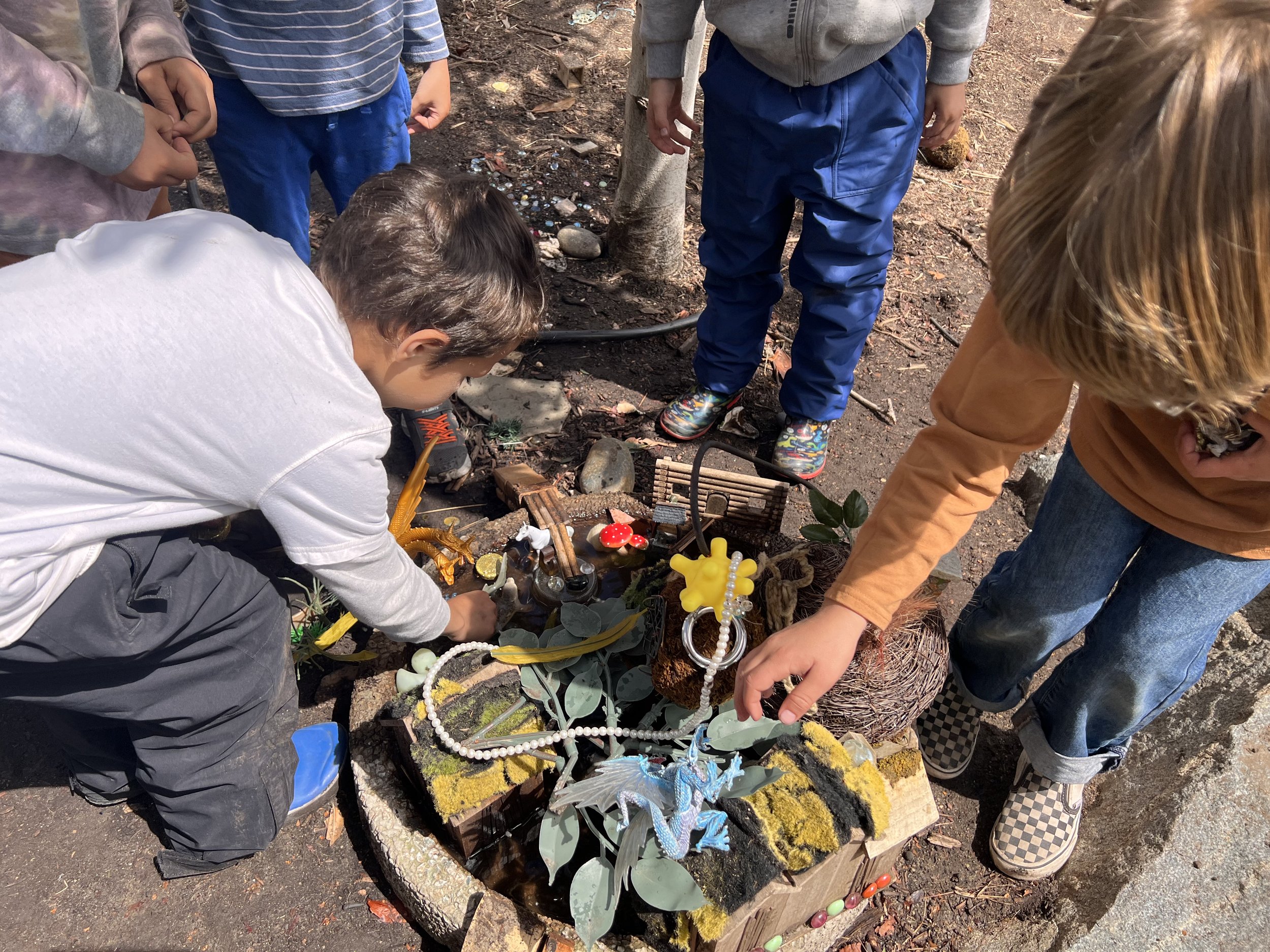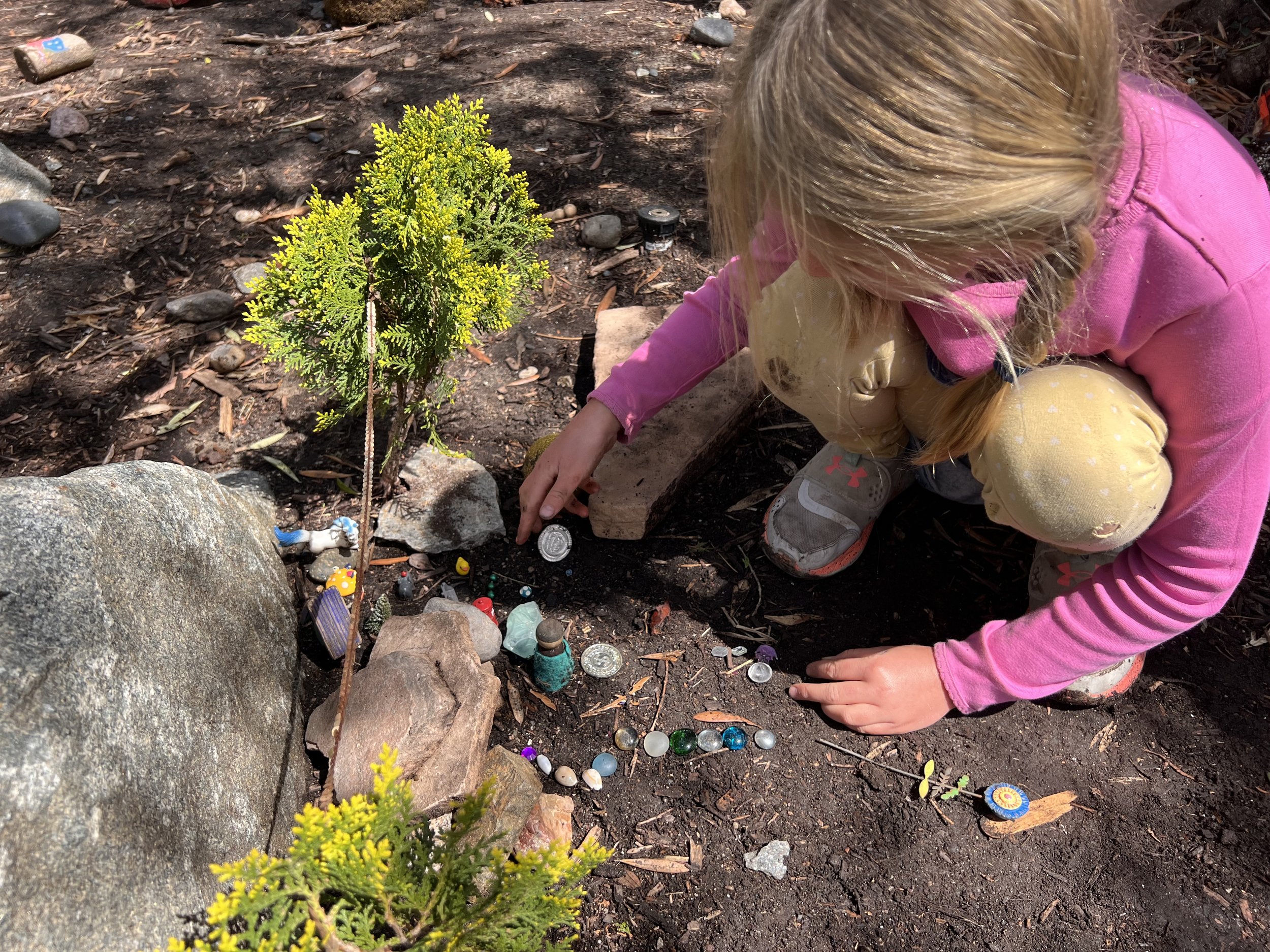The Magic of a Fairy Garden…. The Magic of An Unhurried Childhood… The Magic of a Sanderling Waldorf Education.
When thinking of first graders going off to school, most parents do not imagine the importance of creative play within the actual school day…. but they should.
While Sanderling Waldorf first grade students do learn their letters and numbers, our teachers don’t stop there. They are committed to delivering a comprehensive learning experience with a whole-child approach so that each of their students will benefit far beyond academics. Trained Waldorf teachers know that it takes much more than just the ABCs and the 123’s to ensure that their students turn out to be well-rounded, competent and confident individuals ready to take on the many challenges in life. They know that creative play is the key because it sets the stage for students to become more adaptable and to see more creative solutions to insurmountable problems. In short, they are helping their students to become outside-of-the-box thinkers, creative problem-solvers, and innovators. Being able to think in creative and fluid thought is exactly what is needed if we hope to help children go anywhere beyond pre-existing ideas and solutions. Anybody can merely follow previously thought of rules, guidelines, policies, frameworks, infrastructures – but who is going to do the creating, the inventing, the engineering of new, novel ideas and solutions in the world? Who will lead society towards more progressive solutions? The Answer: The person who, as a child, was given the opportunity to practice creative and fluid thinking as a part of their daily school experience. Allowing different approaches to learning (i.e. color, form, music, outdoor play), and encouraging the use of different learning materials (i.e. dirt, branches, stones, shiny gems, paint, etc.) instead of solely imposing rote memorization in school, is the key to helping a child expand their thinking beyond mere academic concepts.
With this in mind, the next time you see children engaged in an imaginary world of bunnies, birds, squirrels, dragons, tiny mushroom houses, sparkly gems, nests and more, may you be reminded that much more is happening than meets the eye. Think about what is happening in the child’s cognition, in their soul. Think about how valuable this time is that they have wonder…. Perhaps, to imagine that a fairy has just visited their garden and left a sparkling dew drop for them to enjoy? Consider what ideas are being sparked within their minds, and what action the child is driven to take in their play?” The reality is, when a child is allowed enough time on a daily basis for their imagination to be expanded, cognitive capacities grow that will last them for an entire lifetime and will help them to expand their thinking further and further over time.
Play in the early grades also helps children to fine-tune their social skills, make tremendous gains in their emotional development, and develop physically (ie. fine and large motor skills, balance, strength, etc). Additionally, when a child is allowed to be outside in the sun and the fresh air, digging into the earth, and building secret little places for tiny creatures to hide, happiness ensues. And, when a child is happy they are ready to learn, grow and thrive in all areas of their development – mind, body and soul. This whole-child approach is exactly what children need to reach their fullest potential in school, and in life.
But, sadly, in today’s fast-paced society and highly academically-focused school systems, the pressure of academic performance has directly reduced the amount of time children have to play, to imagine and to properly develop in other areas outside of academics. Overemphasis on academic performance in the early grades has significantly increased anxiety in children when there is no research to support this approach. Though intended to help children gain an advantage, this pressure inadvertently robs children of the magical world that used to be called childhood. In fact, nowadays, childhood actually consists of very little “childhood” at all. Increasingly, today’s modern child experiences a hurried and packed daily schedule full of social engagements, extra curricular activities and stressful transitions. Even when they get home to their safe haven, many children have the additional pressure to complete homework and, before they know it, it is time for them to go to bed... Wake up. Repeat. So, when do children ever really get to play? To develop at a natural pace? And when did we, as a society, decide that the youngest children in our schools should be subjected to such adult-like levels of stress?
The good news is that there is a way to help children to preserve their childhood while they also learn at a healthy pace. There is a more developmentally appropriate approach to teaching school-aged children academic concepts while also ensuring that they have time for rich experiences that will expand their imaginations, increase their social and emotional capacities and enrich their bodies as well as their spirits. There is a place in which highly trained teachers facilitate a fun and effective educational experience that also preserves childhood, allowing children to enjoy their childhood without undue anxiety. There is a school that has a curriculum that meets children strategically at their individual and changing levels of development throughout all of the elementary and middle-school grades, ensuring that all aspects of their changing development are being carefully nurtured.
It is all found at Sanderling Waldorf School in Vista, California. When you visit our school, you will see children busy at play, delighting in being allowed to live in the moment, freely exploring nature and going wherever their wide-eyed sense of wonder and imagination takes them. You will find happy, enthusiastic and curious children deeply immersed in experiential learning. You will see children running into our doors when they first arrive, and dragging their feet when they have to leave. Indeed, at Sanderling Waldorf School, children learn academics, but they also learn to form a healthy and happy relationship with learning, overall, and, most importantly, they enjoy an unhurried and happy childhood - fairy gardens and all!



